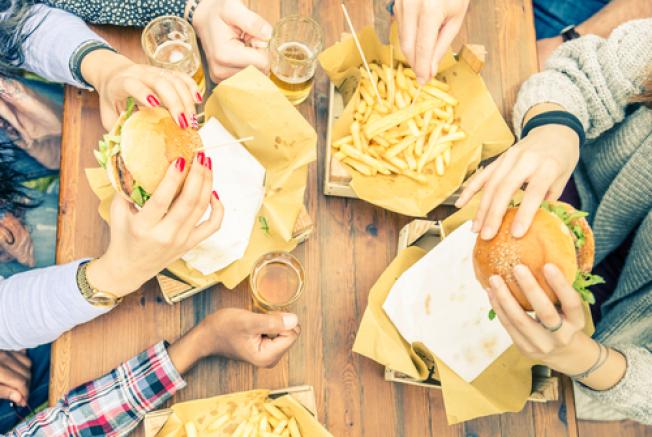Why Do Our Emotions Crave Chocolate and Chips?
Ever wondered why the fridge becomes our comfort zone when someone upsets us? Learn about the hormones involved and the emotional brain's impact on our hunger.

We all know these situations: your spouse says something hurtful - you head to the fridge, the date didn't turn out as you hoped - you head to the fridge, work is too stressful - you go to the fridge. Common in these scenarios is that we are unlikely truly hungry at those moments standing in front of the fridge looking for something to eat.
So why do we automatically head to the fridge when someone upsets us and we feel like crying? Because in situations of great stress or another overwhelming emotion without an outlet, certain substances enter our bloodstream, prompting us to see food as immediate relief. Severe and prolonged stress or sadness releases high levels of the hormone cortisol into our blood, which can severely alter our body's metabolism. When cortisol levels are too high, it can increase blood glucose levels, quickly leading to a sense of heightened hunger.
However, cortisol isn't solely to blame. The hormone ghrelin, also known as the 'hunger hormone', signals hunger but is also secreted under prolonged stress.
If you thought, 'What's the problem? We'll eat a salad and be done with it.' That's not quite accurate. Many studies show that during emotional eating, we seek 'savory', 'fatty', and 'calorie-rich' flavors. Why? Because in emotionally driven eating, our body craves greater energy to replenish its depleted stores, perceiving it as more readily available in these particular foods.
 (Photo: shutterstock)
(Photo: shutterstock)Besides signaling hunger, ghrelin also activates pleasure zones in the brain, making us prefer foods offering maximum enjoyment over those deemed 'healthy' yet not our favorite. In other words, if ghrelin had a voice, it would likely tell us directly: 'You should gobble up that chocolate, it will comfort you' or 'This pizza is known for reducing stress levels, and after you eat it, you’ll return to your normal, peaceful life.'
So what happens to our brain during emotional eating? It operates in three primary modes: emotion, rationale, and wisdom.
Let's explain:
The emotional brain
It's driven by emotions, not rationally. This brain 'awakens' when we're tired, out of control, irritable, sad, etc. Thus, thought, behavior, and cognition become exaggerated. The foods we seek in the fridge when this brain functions are high in fat and calories, and the longer we linger in our state, the more chances of impulsive eating, leading to significant regret and sharp weight gain.
The rational brain
This one awakens when our emotions are restrained to the point that even our awareness of them is minimal. Acting from this state, we behave calmly, moderately, and detached from even minor emotions. The danger here is as we approach the fridge, we may restrict eating to extraordinary extents. Eating here becomes obsessively controlled in terms of quantity and type, potentially causing drastic weight loss and endangering our nutritional balance.
So what do we do? Here a third state comes into play, a synthesis between the previous two:
The wise brain
This state is a balance between emotional and rational brains. The wise brain is a combo of intellect and emotion, head and heart. Here, our perception is clear and comprehensive, and food choices will not be destructive. When the brain functions in this state, it helps us select foods more carefully and avoid temptation by fatty, calorie-rich foods.
And now the question you all probably ask yourselves: 'How do we keep the 'wise brain' on permanently?':
The answer is simple, starting with our roots saying: 'Healthy mind in a healthy body'.
Do you recognize within yourself chronic feelings of sadness, despair, fatigue, lack of control, and anger? Don’t ignore your soul and expect salvation from nowhere. A healthy mind in a healthy body and vice versa. Increase your awareness to yourself, to the emotions swirling inside, and the traces they leave after every 'storm'. The duty to identify the emotion guiding us at any given moment lies with us. True, 'the task is not yours to complete' and 'no prisoner can free himself from prison', but let's at least begin by asking ourselves 'what does this emotion do to us, and how can we address it'?
You might be surprised to find that often, maybe too often - the emotion tells us we are not truly hungry, but in need of meaningful conversation with someone we respect, conversation to ease feelings of loneliness, sadness, and pain, for example. Plus, perspective is integral to the matter. When emotionally 'low', we tend to paint a problem as a 'monster', overly menacing and fear-inducing. Meanwhile, food appears as a 'fairy godmother' with magical solutions, here to lift us from deprivation and misery.
We all must beware this honey trap (because what's easier than comforting ourselves with our favorite food?), but it will only happen if we increase our awareness of our emotions and sensitivity, come to terms with these emotions, and view them proportionately. Mastering self-work — identifying emotions and recognizing the brain state — can reduce our dangerous food cravings thwarting both health and happiness.
Learn how to eat healthily, both physically and mentally: A lecture by Rabbi Zamir Cohen

